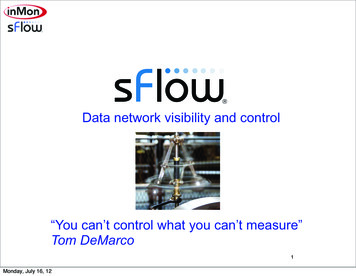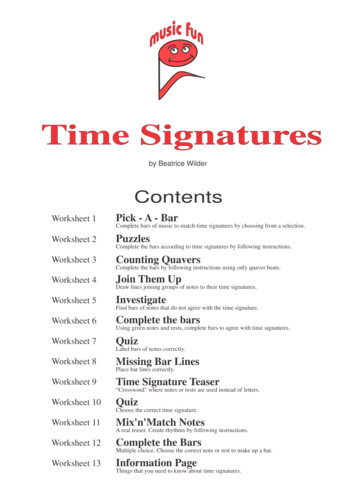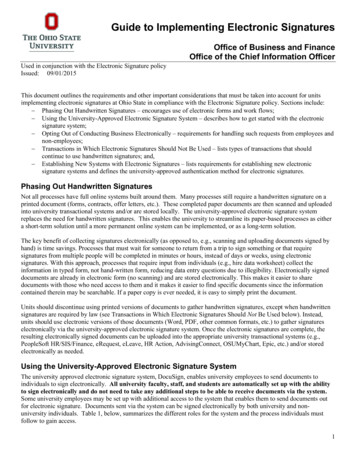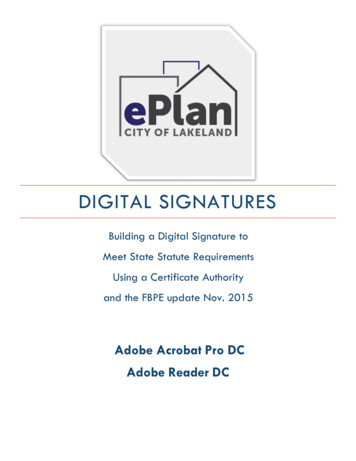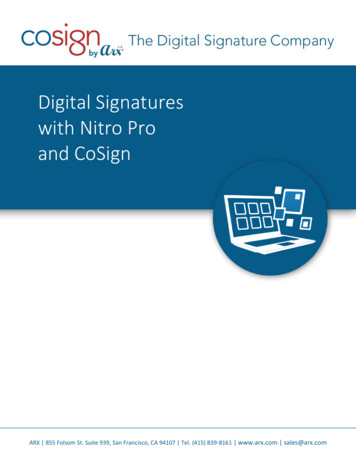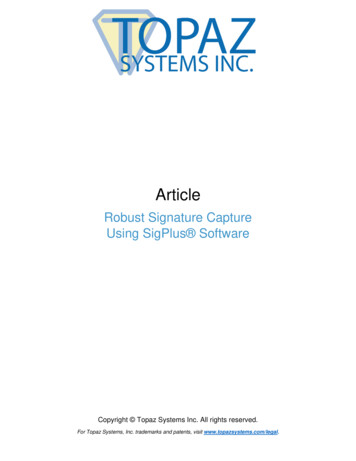
Transcription
Updated 6/21/2018Q: Can I notarize signatures for immediate family?Q: Can I refuse to provide notary services?Q: What should I do if a person produces identification with a name different from thename being signed?Q: When I personally know the signer, am I required to indicate that fact in my notarialcertificate?Q: May I attest to a photocopy of a resident alien card issued by the U.S. Department ofJustice, Immigration and Naturalization Service?Q: Can I sign a document as one of the witnesses if I am also acting as the notary public forthat transaction?Q: Can I certify a photocopy of a tax return for customers who are enrolling their childrenin college or applying for a mortgage on a new home?Q: May I require the fingerprints of a person for whom I notarize?Q: Must a notary public sign the notarial certificate when notarizing a signature?Q: May I notarize a signature on a document that has been prepared in another state, or ona document that will be sent to another state or country?Q: When notarizing a signature, what elements must be included in my notarial certificate?Q: How do I file a complaint against a Notary?Q: How long does a Notary Complaint take?Q: How do I resign my Notary commission?Q: Is there a shortcut for renewing my notary commission?Q: Do I keep my Notary Stamp even if I am no longer employed or was fired from myprevious job?Q: How do I look up a notary? OR I can’t remember my notary certificate number, is therea way I can look that up?Q: I am moving in-state and need to update my address OR I am moving out of state.Q: I legally changed my name, how do I update and can I still use my old stamp?Q: I’m a Notary in another State and I’m about to move to Florida, does my Notarycommission transfer states?Q: I need to a copy of my Notary Certificate OR I need to report my stamp lost or stolen.Q: I want to become a notary, but I have a misdemeanor and/or a felony on my record.Does that make me ineligible?Q: Can I notarize signatures for immediate family?A: A notary public may not notarize a signature on a document if the person whose signature isto be notarized is the spouse, son, daughter, mother, or father of the notary public. A notary public may notarize a signature for immediate family members on a marriagecertificate.Q: Can I refuse to provide notary services?A: Yes, a notary may refuse to perform a notarization. The situations in which a notary mustrefuse are set forth in the Florida Statutes sections 117.05 and 117.107.
Updated 6/21/2018Q: What should I do if a person produces identification with a name different from thename being signed?A: This problem may occur in different situations. In some situations, individuals may havesimply neglected to update their identification cards after a name change. You should direct themto the local Division of Motor Vehicles office to make the necessary changes.In some instances, individuals may need to sign a document with their former name after makingthe necessary updates to their identification cards. A classic situation arises when a womanchanges her name after marriage and has to sign a document, such as a warranty deed, in herformer name. You may notarize her signature if she signs both names, but you may want toindicate that fact in your notarial certificate.For an acknowledgment, you could state, "The foregoing instrument was acknowledged beforeme this day of , 19 , by Mary Smith, who represented to me that she wasformerly known as Mary Jones, and who provided a Florida driver license, No. 123 45 678 890in the name of Mary Smith as identification." You may also want to include information such asthe date of birth, expiration date, or physical description.You may always provide additional information in your certificate, especially if it helps toclarify the circumstances. You may also want to include information about supportingdocumentation concerning the name change or additional identification cards, if available, inyour journal.Q: When I personally know the signer, am I required to indicate that fact in my notarialcertificate?A: Yes. When notarizing a signature, a notary public must always certify the type ofidentification relied upon, either personal knowledge or other form of identification produced.This can be done as part of the main wording in the notarial certificate or at the bottom of thecertificate.We have seen notarized documents where the notary simply noted "PK" or "DL", meaning"personally known" or "driver's license." These abbreviations are not clear, and we recommendthat you make more specific notations about identification. Although not required, it is a goodpractice to indicate the identification card number and the state or country that issued the card.This will help to protect you in case a signer later claims that he or she did not sign the documentand did not appear before you for the notarization.Q: May I attest to a photocopy of a resident alien card issued by the U.S. Department ofJustice, Immigration and Naturalization Service?A: Yes. This is a frequent request in Florida because of the large number of resident aliens livinghere. We have consulted the office of Immigration and Naturalization Service in Miami andlearned that a person cannot obtain a certified copy of a resident alien card from any INS office.Therefore, if you have the original card, you may attest to the trueness of a photocopy if youmake the copy or supervise the making of the copy. You should use a notarial certificate insubstantially the same form as that provided in the notary law for attested photocopies.
Updated 6/21/2018The INS office emphasized that an attested photocopy of a resident alien card should not be usedto prove residency status. Although the notary is not responsible for how the attested photocopywill be used, it may be a good idea to refer the party to an INS office if such certification isneeded. If you believe that an attested copy may be used for an improper purpose, you shoulddecline to attest to the copy.Q: Can I sign a document as one of the witnesses if I am also acting as the notary public forthat transaction?A: Generally, a notary public may sign as one of the witnesses and as the notary public on adocument. In fact, it is a common practice among Florida notaries, particularly on real estatetransactions. Typically, you will see the title clerk sign as one of the two required witnesses andthen notarize the document signer's signature. In addition, a Florida court has held that "there isnothing to prevent a notary from also being a witness." See Walker v. City of Jacksonville, 360So.2d 52 (Fla. 1st DCA 1978). However, before signing as a witness, the notary should ensurethat the document does not require the notarization of the witnesses' signatures. For example, aself-proof affidavit on a will or codicil requires the notarization of the signatures of the testatorand both witnesses. If the notary signed as a witness in this instance, he or she would benotarizing his or her own signature, which is a criminal violation of the notary law.The notary should also certify in the notarial certificate the name of the person whose signatureis being notarized. Absent such specific notation, the law presumes that all signatures werenotarized. Thus, the notary could unintentionally notarize his or her own signature if the notarialcertificate is not specific.Therefore, providing that the document does not require the notarization of the witnesses'signatures, the notary may be one of the two subscribing witnesses as well as the notary public.Q: I am often asked to certify a photocopy of a tax return for customers who are enrollingtheir children in college or applying for a mortgage on a new home. May I do so?A: No. Section 117.05(12), Florida Statutes, which authorizes notaries to attest to photocopies,requires the following: the notary may not certify a copy of a public record, if a copy can be obtained from theofficial source;the notary must have the original document from which to make the copy;the notary must either make the copy or supervise the making of the copy; andthe notary must complete a certificate in substantially the form specified in the law.In this case, the original tax forms have been filed with the Internal Revenue Service, and nooriginal is available from which you can photocopy the document. However, certified copies areavailable from IRS. For additional information, your customer should visit an office of theInternal Revenue Service or call (800) 829-1040.Q: May I require the fingerprints of a person for whom I notarize?A: No. Florida law does not require, nor authorize, notaries to take fingerprints from personswhose signatures they notarize. Many notary journals or records books allow space for a
Updated 6/21/2018thumbprint, but this feature is optional. If there is no objection from the signer, you may record athumbprint in your journal. However, you should not refuse to provide notary services basedsolely on the person's refusal to provide a fingerprint in your record book.Q: Must a notary public sign the notarial certificate when notarizing a signature?A: Yes. When notarizing a signature, you are required by law to date, sign, and affix your seal toa notarial certificate. See §§ 117.05(3)(a) and (4), Fla. Stat. This is in addition to therequirements that your notary seal contain your exact commissioned name and that you mustprint, type, or stamp your name below your signature. These provisions of the law ensure theability to identify the notary, if necessary, and confirm that the notary is the person whocompleted the notarial certificate and affixed the notary seal.Q: May I notarize a signature on a document that has been prepared in another state, or ona document that will be sent to another state or country?A: Yes, but you should indicate the correct venue (State of Florida, County of ) where thenotarization occurred and complete a proper notarial certificate with all the requirements of theFlorida notary law.Q: When notarizing a signature, what elements must be included in my notarial certificate?A: Sample notarial certificates are found in section 117.05(13), Florida Statutes. The essentialelements are: the venue where the notarization takes place (State of Florida, County of );the type of notarial act performed whether you administered an oath to the documentsigner or took his or her acknowledgment (look for the key words "sworn to" or"acknowledged");that the document signer personally appeared before the notary at the time of thenotarization (usually indicated by the words "before me");the date of the notarization;the name of the person(s) whose signature is being notarized;the type of identification relied upon in identifying the signer, either based on personalknowledge or an acceptable form of identification;the notary's signature (exactly as commissioned);the notary's name printed, typed, or stamped below the signature; andthe notary's official seal (The seal must contain the words "Notary Public-State ofFlorida" and the notary's name, expiration date, and commission number, and must beaffixed in black ink.)If the prepared notarial certificate does not have each of these elements, you should add theappropriate language to the certificate to make it fully comply with the statutory requirements.Q: How do I file a complaint against a Notary?A: Please visit the “File a Complaint against a Notary” portion of our website located here:https://www.flgov.com/notary-complaints/Click on either the Word Document or PDF Document to download the form to your computer.You can fill it out on the computer or by hand. Please make sure to include a copy of the
Updated 6/21/2018notarized document in question and any other documents to help support your claim. Please sendthe notary complaint to our office by mail using the address or fax number on the top left of theComplaint form.Q: How long does a Notary Misconduct Investigation take?A: The time frames vary case by case and depend on the cooperation of both parties involved.On average, it takes anywhere between 2 to 6 months to close out an investigation if responsesare completed in a timely manner.Q: How do I resign my Notary commission?A: Please send a letter to our office and include the following information:1. Name as commissioned and Certificate number2. Attach the original Notary Commission Certificate OR state in the letter it is no longer in yourpossession3. State in the letter that you have destroyed your notary stamp OR that you have included it withthe letter for our office to destroy4. Provide a forwarding address to send a resignation acceptance letter5. Date resignation effective* If you have a log book, it is at your discretion if you would like to keep it for personal records(recommended), destroy it, or include it with the letter for our office.** Our office address is:Notary SectionOffice of the General CounselThe Capitol, Suite 209Tallahassee, FL 32399Q: Is there a shortcut for renewing my notary commission?A: No. The application process for reappointment is exactly the same as for a first-timeappointment. Incomplete applications will not be processed until the applicant submits all therequired information. When applying for a renewal commission, treat it as a new application anddo not refer our office or the Notary Commissions and Certifications Section to your previousapplication for information.Q: Do I keep my Notary Stamp even if I am no longer employed or was fired from myprevious job?A: Yes, you should keep your stamp even if your commission, bond, and seal were paid for byyour employer. Your employer has no right to keep these items and it may be a criminal offenseto do so. According to section 117.05(3)(b), Florida Statutes, “The notary public official seal andthe certificate of notary public commission are the exclusive property of the notary public andmust be kept under the direct and exclusive control of the
documentation concerning the name change or additional identification cards, if available, in your journal. Q: When I personally know the signer, am I required to indicate that fact in my notarial certificate? A: Yes. When notarizing a signature, a notary public must always certify the type of

